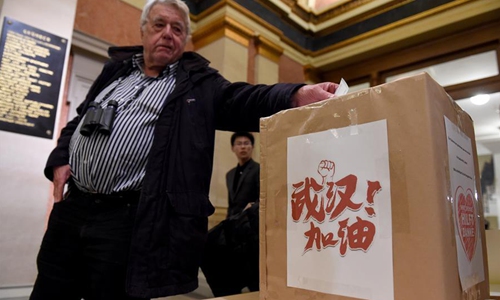HOME >> OPINION
New York Times wrong to accuse China of lacking global cooperation
By Ai Jun Source:Global Times Published: 2020/2/9 20:48:40

A man donates after the 2020 Gala concert for Chinese New Year at the golden hall of Vienna's Musikverein in Vienna, Austria, Feb. 4, 2020. The 2020 Gala concert for Chinese New Year was held in the Golden Hall in Vienna, Austria on Tuesday evening. This concert also launched a fundraising event for the fight against the coronavirus outbreak in China. (Xinhua/Guo Chen)
The first members of a World Health Organization (WHO)-led international team to investigate the outbreak of the novel coronavirus epidemic will leave for China on Monday or Tuesday, Reuters quoted WHO chief Tedros Adhanom Ghebreyesus as saying on Sunday. China appreciates and welcomes the team, while looking forward to future cooperation in the fight against the disease.
Ironically, only two days ago, the New York Times (NYT) published a report claiming China was giving a "cold shoulder" to WHO and US Centers for Disease Control and Prevention, both of which offered to send a team of experts. "No invitation has come," the paper reported after describing the US as ready to help. The article came to a rash conclusion that top Chinese leaders "do not want the world to think they need outside help."
Setting aside how biased was the article, the author has not at all gotten the facts straight: China has in fact been maintaining close collaboration with WHO right after it realizes the severity of the epidemic, including sharing the genetic sequence of the new virus and keeping WHO updated on the epidemic. On January 28, Chinese President Xi Jinping and Tedros reached an agreement over WHO sending international experts to China to increase understanding of the new coronavirus and guide the global response.
China has notified the US of the epidemic and relevant control measures over 30 times since January 3, according to Chinese Ministry of Foreign Affairs. As early as January 29, China's National Health Commission replied through official channels to the US that they welcomed the US to join a WHO joint expert group.
It is quite obvious the NYT has some serious misunderstandings about not only China, but also the phrase "cold shoulder."
Time is needed for people to get to know a brand new disease and it has to be acknowledged that the world has limited knowledge of the novel coronavirus at the moment. As frustrating as it may seem, there are still questions left unanswered, including exactly how fast the virus is spreading and how it spreads. But this is not solely China's challenge. According to the Global Health Security Index, the first comprehensive assessment of global health security capabilities in 195 countries, no country, including the US, is fully prepared for major infectious disease outbreaks.
China has realized its issues which need to be addressed and measures in need of improvement during the ongoing fight against the epidemic Yet in general, it has learned the lesson from the 2003 SARS outbreak, reformed its system of disease prevention and control. During the current epidemic, the country has strengthened cooperation with the WHO and the international community in a much more open, transparent, proactive and timely manner than its response in 2003. Its efforts have thus been acknowledged by the WHO.
However, some US forces are stubbornly sticking to their hostility against China and skirting around the facts, in an effort to smear China's response to the epidemic, thus to attack China's system. Paranoid accusations, such as "coronavirus crisis shows China's governance failure," are made by Western media. Worse, some US senators even called on the WHO to grant observer status to Taiwan on January 31. Some forces in the US are continuously creating and spreading panic over the virus in China.
China will always enhance its cooperation and communication with the WHO and international communities over the updates of the novel coronavirus while improving its own techniques to prevent and control the deadly disease. Yet trust is the basis of collaboration. Some people in the US are making ill use of the epidemic to achieve their own political goals, which will jeopardize mutual Beijing-Washington trust and efforts to bring the virus outbreak under control as well as the image of the US.
In the face of the epidemic, both China and the US have more reasons to prioritize their cooperation on global health and pandemic preparedness, which may in turn promote their mutual trust and benefit future interactions between the two countries.
Posted in: OBSERVER